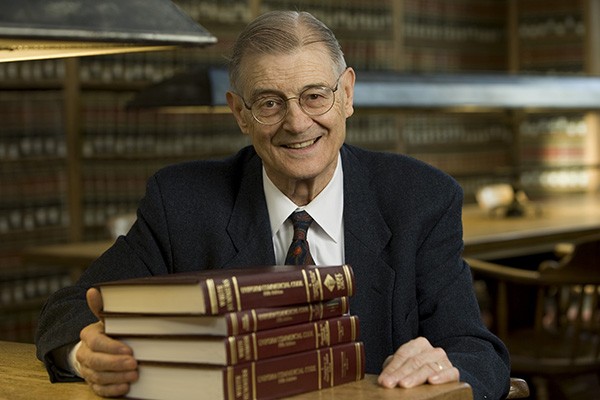Robert Summers, pre-eminent legal scholar, dies at 85
By Susan Kelley
Robert S. Summers, who grew up milking cows on his family’s farm in Oregon and went on to co-write the most widely cited treatise on U.S. commercial transaction laws and help draft laws governing Russia, Egypt and Rwanda, died March 1 in New Canaan, Connecticut. Summers, Cornell’s William G. McRoberts Research Professor Emeritus in Administration of the Law, was 85.
A Cornell faculty member for 42 years, Summers was best known as the co-author of “The Uniform Commercial Code” (West Publishing Co.), written with James J. White in 1972 and now in its sixth edition. The four volumes make up the most widely cited treatise on the rules that govern the sale of goods and other commercial transactions across the country.
“It is the bible for lawyers and students interested in the area,” said Robert Hillman, J.D. ’72, Summers’ former student and now the E.H. Woodruff Professor of Law.
Summers joined the Cornell Law School faculty in 1969. During his career, he produced 55 books and more than 100 articles, including influential works on legal realism, statutory interpretation, and form and substance in the law.
“It is impossible to exaggerate Bob’s impact on Cornell Law School. His memorable presence touched the lives of countless students and colleagues,” said Eduardo M. Peñalver ’94, the Allan R. Tessler Dean and Professor of Law, whose office was next to Summers’ when Peñalver was a junior faculty member. “Even then, in the last few years of his extremely distinguished career, Bob was larger than life. He loved Cornell deeply, and he was passionately devoted to our students and to the craft of teaching.”
Summers is also known for helping draft the laws that govern several countries. In 1993 the Russian government called on him to help draft its civil code. He later served as adviser to the Drafting Commission for the Egyptian Civil Code (1998-99) and as principal drafter for the Code of Contract Law for Rwanda (2006-10).
Summers collaborated with Hillman to write a major text in contract law, “Contract and Related Obligation: Theory, Doctrine and Practice” (West Publishing Co., 1987), now in its sixth edition. “No one worked harder than Bob, who had unlimited energy and zeal for each project he entertained,” Hillman said.
His contributions extended beyond scholarship. Among the most important, Hillman said, was co-founding in 1969 the Council on Legal Education Opportunity, a national organization dedicated to increasing the representation of minority and low-income students in law schools.
“That was one of the largest, most satisfying public service activities I have ever been privileged to engage in in my life,” Summers said when he retired in 2010. “It was extremely inspiring.”
In his own classes, he was known for his dedication to the Socratic method of teaching: instilling principles and concepts through rigorous questioning and argument, rather than “ladling [information] out on a spoon,” as he said.
“Generations of Cornell alumni know that Bob loved the Socratic method and was a demanding and, at first, frightening teacher,” Hillman said. “By the end of the semester, students realized that Bob’s style was in their great interest … and that he was a dedicated teacher who cared greatly about the success of his students.”
Summers was born Sept. 19, 1933, on his family’s farm in Halfway, Oregon. As a child, he would walk 300 yards from his home to the Lone Fir Country Schoolhouse. Among his class of 24 students, he was valedictorian and won the annual Oregon State Future Farmers of America High School Public Speaking Contest.
While a student at the University of Oregon, Eugene, he drove a school bus to defray the cost of college. After graduating in 1955, he studied as a Fulbright scholar at the University of Southampton. In 1959, he earned his LL.B. degree from Harvard University, having studied under two leading scholars in jurisprudence, Herbert Hart of Oxford University, and Lon L. Fuller. In 1960, after practicing law for two years, he joined the faculty of the University of Oregon Law School, where he taught for eight years.
“Bob was a renowned authority in two legal fields that most find quite distinct: contract and commercial law, and also jurisprudence and legal philosophy,” said Stewart Schwab, the Jonathan and Ruby Zhu Professor of Law and former dean. “He had an international reputation in both areas, and had dozens of close professional friends and colleagues in America, Europe and elsewhere.”
Summers also cared deeply for the well-being of Cornell Law School, Hillman said.
“When architects planning the first new addition to Myron Taylor Hall suggested that faculty offices would have to be underground, Bob ably led the insurrection that convinced the architects that the faculty would have none of that,” Hillman said. “I’m grateful each time I look out the window of my office in Myron Taylor Hall. I’m sure others feel the same way.”
He is survived by his wife, Dorothy, of New Canaan, Connecticut, five children and 14 grandchildren.
Media Contact
Get Cornell news delivered right to your inbox.
Subscribe

